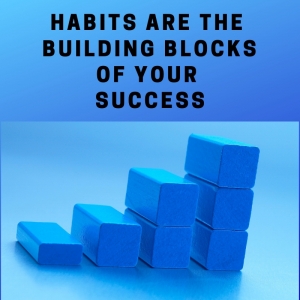 Here it is the beginning of the second quarter of 2019. How are you doing with your New Year’s Resolutions? Did you make them? Have you kept them?
Here it is the beginning of the second quarter of 2019. How are you doing with your New Year’s Resolutions? Did you make them? Have you kept them?
No? Well, you’re not alone.
“Studies have shown that less than 25% of people actually stay committed to their resolutions after just 30 days, and only 8% accomplish them.”
In the above quoted article, the author recommends that you turn your resolution into a goal. Now, I’m a big believer in goals, but when most people make resolutions, they aren’t looking at creating a particular goal.
Generally, people are looking to shift their day-to-day behavior. And when we’re talking about shifting every day behavior, we are always talking about habits not goals.
What is a Habit?
Definition of Habit
- a settled tendency or usual manner of behavior
- an acquired mode of behavior that has become nearly or completely involuntary
- a behavior pattern acquired by frequent repetition or physiologic exposure that shows itself in regularity or increased facility of performance
This is exactly why most people fail with their New Year’s resolutions. Because they think that all they have to do is decide once, on January 1st, to make this change. But a habit is behavior that you don’t think about! It’s behavior you do automatically.
Obstacles to Better Habits
In my experience, there are two major obstacles to changing your habits:
- Your existing habits
- Forgetting that you decided to do things differently
You decide on January 1st to do this thing differently, but within 24 to 48 hours, you’ve forgotten that you made that decision and your existing habit takes over.
You may notice that you forgot. You may feel bad about it for a bit and try to remember. But inevitably, your existing habits override this decision and you’re back to doing what you’ve been doing.
See, habits are really powerful. They are your brain’s way of automating everything it can, so it can conserve your energy for the decisions you have to make intentionally. So, your brain creates all these short cuts called neural pathways.
The more frequently a neural pathway is used, the less energy it takes to trigger it. And so the longer you’ve had a habit the easier it is to continue that habit.
Creating a new habit takes a lot more brain power, concentration and intention and most of all memory! You have to remember to do things differently!
Bottom line – you don’t eliminate old habits, you replace them with new habits.
And in order to do that, you must remember to repeat the behavior over and over and over until you no longer need to think about it. Until your brain has hardwired the new neural pathway.
I’ve heard that it takes 21 days to create a new habit. That has not been my experience. I think if you can remember to do it every one of those 21 days – by the end of that three weeks, it may have reached the level of automation that makes a habit. But because people forget, and then they have to remember again, it usually takes longer.
Why Are Habits Powerful?
When we study people who are highly successful and look at what they do and don’t do, what we find is that the only difference usually between them and us is simply a matter of their habits. Whether its a behavior or a habit of thought, it is very often a person’s habits that create their results in their lives.
And so many of us who are on this crazy journey called life try to emulate those habits. We make New Year’s Resolutions to incorporate those habits into our lives.
Benefits of Strong Habits
- Reduce decision stress
- Create consistency of behavior which generates momentum
- Requires less energy
Strong habits reduce decision stress. Because the essence of a habit is that the decision’s already been made. Once something is a habit, you don’t have to think about it. You don’t have to weigh the pros and cons. And you don’t have to be “in the mood” to do it. You just do it, without thought, automatically.
And doing this behavior automatically generates momentum. Every time you have to pause to think about a decision or make a choice about a behavior, you sap your momentum. The better your habits the better your productivity, your satisfaction with your results and your enjoyment of your life.
 How often have you felt like changing things is a bit like Sisyphus pushing that boulder up the hill only to find the boulder back at the bottom of the hill the next day. It’s exhausting! But once that behavior is a habit, it becomes easy, effortless and obvious. Of course, I brush my teeth every night before bed. I don’t even have to think about it…
How often have you felt like changing things is a bit like Sisyphus pushing that boulder up the hill only to find the boulder back at the bottom of the hill the next day. It’s exhausting! But once that behavior is a habit, it becomes easy, effortless and obvious. Of course, I brush my teeth every night before bed. I don’t even have to think about it…
For example, effective time management is essentially a mix of strong structure and effective habits.
Think about it, most people don’t really think about planning or scheduling – they just do. It’s a habit. People with effective time management habits are more productive. People with poor time management habits struggle with procrastination, being chronically late and stress about their deadlines and obligations.
When I work with clients on effective time management (which is the MOST common goal area), we essentially create a strong structure and then I hold them accountable to their new time management habits!
How to Build a New Habit
First choose a habit. When you choose the new habit think about these questions:
- Make this new behavior as simple and as clear as you can.
- Think about how it fits into your life.
- When will you do it?
- What will come before and what will come after this new habit?
- Why do you want to do it (what’s the benefit)?
Then, once you’ve chosen your new habit and defined it very specifically, then you must implement it. Set up reminders. Ask for support to help you remember. Set up whatever structure you need to make it easy to remember and maintain.
For example, my New Year’s Resolution for 2019 was to reduce and eliminate my use of single-use plastic. It was a very clear, simple behavior. And I’m clear about why I’m doing it – to reduce my footprint on the planet.
I looked at where I was currently in the habit of using single-use plastic items and set up some structures for the new behavior. For example, I purchased a refillable water bottle for my car and now I refill it every morning when I packed my lunch for the office. I put my reusable shopping bags in the car and purchased reusable vegetable bags, adding those to my shopping bags. When I go grocery shopping, I put the shopping bags with my purse in the front of the car, so I don’t forget them.
I have also told a few people about it, so they could help me remember.
And what do you know, I’ve been doing really well with this new habit.
So what new habit would you like to implement in your life? Tell me about it in the comments below!





